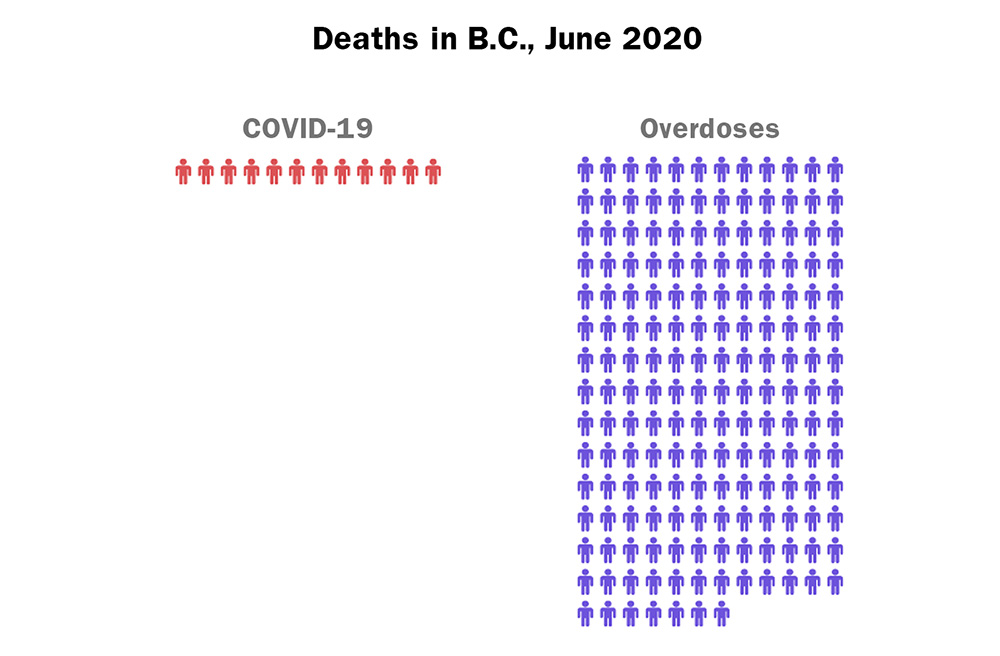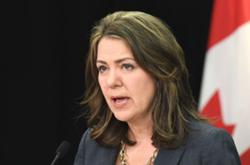B.C. has recorded back-to-back record months for drug overdose deaths, with June claiming 175 lives and surpassing May’s previous record of 171 fatal overdoses.
And every one of the deaths could have been prevented if governments dealt with drug use as a health issue, said Dr. Perry Kendall, former provincial health officer and co-interim executive director at the BC Centre on Substance Use.
“That each one of these deaths was entirely preventable makes this emergency all the more tragic.”
Pandemic disruptions to cross-border supply chains have caused the street supply of illicit drugs to become increasingly toxic. About 15 per cent of deaths in June involved fentanyl concentrations, compared with eight per cent in January.
Kendall said growing concern about COVID-19 resulted in the elimination of many supports for people who use drugs, and resulted in some users not seeking support at all.
Measures like an expansion of the province’s safe supply program and a new overdose prevention app have failed to halt the rising number of deaths.
The pandemic has erased all progress made in the fight against an increasingly poisoned drug supply. This is the fourth month in a row with more than 100 drug overdose fatalities in B.C. There were more than twice as many deaths this June as there were a year ago, when 76 people died.
Kendall said the deaths were the result of current drug policies.
“The end result of prohibition is that drugs become more and more potent and more and more difficult to stop,” said Kendall. It’s easier to transport highly-concentrated substances, increasing the risk for users.
Provincial health officer Dr. Bonnie Henry called on B.C. to decriminalize drugs to save lives more than a year ago, a proposal rejected by the provincial government.
“Today’s report clearly shows us that the tragedy of overdose deaths from the toxic street drug supply in B.C. continues to escalate,” she said in a news release.
Chief coroner Lisa Lapointe said the rising deaths show it’s impossible to protect people buying street drugs.
“The risks of the illicit market are unmanageable, and access to safe supply for those with this medical condition is essential to save lives,” she said.
Guy Felicella, a peer clinical advisor at the BC Centre for Substance Use, said it’s striking how quickly governments responded to the COVID-19 health emergency while failing for years to address poisoned drug supplies.
There were almost 15 overdose deaths for every COVID-19 death in the province in June. Twelve people died from the virus between June 1 and July 2.
“It took three days to almost lock down a country,” said Felicella of provincial and federal measures to slow the spread of COVID-19.
He doesn’t know what government is waiting for to take similarly bold action against a toxic drug supply — “maybe 250 lives lost in a month?”
At least 5,741 people have died in B.C. of poisoned drug overdoses since January 2016, with 728 dying since the beginning of 2020.
“It’s really that some lives just mean more than others,” said Felicella. “And obviously drug users’ lives don’t mean much to people because if they did, they wouldn’t allow this to continue.”
Henry renewed her 2019 call for decriminalization in May after overdose deaths were almost double the figure from the same month a year ago. The Canadian Association of Chiefs of Police backed decriminalization of drug use last week.
But the provincial government maintains it’s a federal issue.
Kendall, who declared opioid overdoses a public health emergency in 2016, said that moralistic views of drug use and discrimination against drug users make it difficult to build political will to take action.
“If we had an adult discussion around drug policy, we would look at policies which prevented the harms from the drugs themselves,” he said.
Overdose prevention and supervised consumption sites continue to report no deaths at their sites, and no deaths have been linked to people taking prescription alternatives to the illicit drug supply.
But the poisoned drug crisis continues to have a disproportionate impact on the province’s more vulnerable populations.
Deaths among First Nations people have nearly doubled to 89 in the first five months of this year compared to 2019. First Nations people account for 3.4 per cent of the province’s population but 16 per cent of overdose deaths, said the First Nations Health Authority.
The Vancouver Coastal Health region is the most affected with 33 deaths per 100,000 people, followed by Northern Health with 32 deaths per 100,000.
Felicella said safe supply needs to be rapidly expanded in ways people who use drugs are comfortable with, and effective decriminalization at a provincial level needs to happen immediately.
“Everybody needs to be accountable for their own province [and] not pass it off to the federal government anymore,” he said.
“You need decision-makers to start listening to people on the ground who have been screaming for this for 20 years. Nobody’s listening.”
And while governments wait, people are dying, said Felicella.
“I’m hopeful that some change starts, but sadly it’s cost this many lives already.” ![]()
Read more: Health, Rights + Justice, Politics
















Tyee Commenting Guidelines
Comments that violate guidelines risk being deleted, and violations may result in a temporary or permanent user ban. Maintain the spirit of good conversation to stay in the discussion.
*Please note The Tyee is not a forum for spreading misinformation about COVID-19, denying its existence or minimizing its risk to public health.
Do:
Do not: